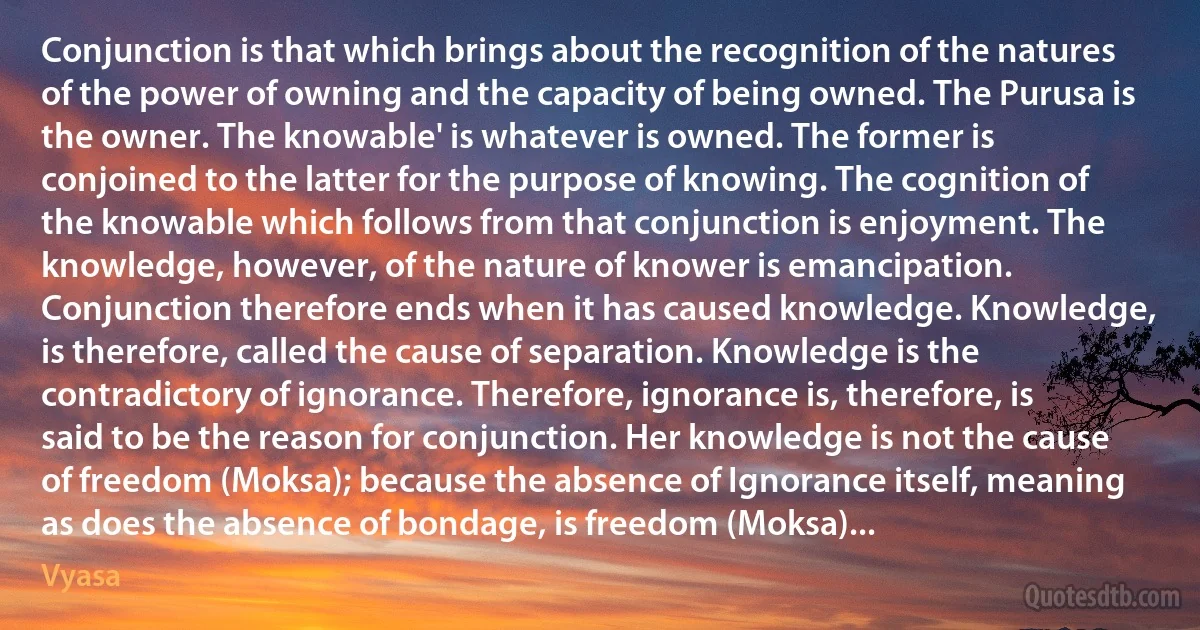
Conjunction is that which brings about the recognition of the natures of the power of owning and the capacity of being owned. The Purusa is the owner. The knowable' is whatever is owned. The former is conjoined to the latter for the purpose of knowing. The cognition of the knowable which follows from that conjunction is enjoyment. The knowledge, however, of the nature of knower is emancipation. Conjunction therefore ends when it has caused knowledge. Knowledge, is therefore, called the cause of separation. Knowledge is the contradictory of ignorance. Therefore, ignorance is, therefore, is said to be the reason for conjunction. Her knowledge is not the cause of freedom (Moksa); because the absence of Ignorance itself, meaning as does the absence of bondage, is freedom (Moksa)...
VyasaRelated topics
absence bondage cause cognition conjunction contradictory emancipation freedom ignorance knowing knowledge meaning nature owner power purpose reason say whatever endsRelated quotes
About three decades ago, when I needed to purchase some office equipment, chiefly steel filing cabinets, I was amused by a firm whose computer, having been informed that R. P. Oliver was the purchasing agent for R. P. Oliver, offered the former a secret "kick back" of 20% if he would buy their products at the expense of the latter. Another firm offered the purchasing agent a "complimentary" woman's mink jacket, which would be sent with his compliments to "any address," thus tactfully permitting him to choose between his wife and his doxy. That would have been good business, had the computers been operated by someone with intelligence enough to notice the odd coincidence between the name of the purchasing agent and the name of the owner to be exploited.

Revilo P. Oliver
We've already said that it's the Holy Spirit who gives us the ultimate assurance of Christianity's truth. Therefore, the only role left for argument and evidence to play is a subsidiary role. I think Martin Luther correctly distinguished between what he called the magisterial and ministerial uses of reason. The magisterial use of reason occurs when reason stands over and above the gospel like a magistrate and judges it on the basis of argument and evidence. The ministerial use of reason occurs when reason submits to and serves the gospel... Should a conflict arise between the witness of the Holy Spirit to the fundamental truth of the Christian faith and beliefs based on argument and evidence, then it is the former which must take precedence over the latter, not vice versa.

William Lane Craig
Virtue is infinitely various. There is no situation in which a rational being is placed, from that of the best instructed Christian down to the condition of the rudest barbarian, which affords not room for moral agency; for the acquisition, exercise, and display of voluntary qualities, good and bad. Health and sickness, enjoyment and suffering, riches and poverty, knowledge and ignorance, power and subjection, liberty and bondage, civilisation and barbarity, have all their offices and duties, all serve for the formation of character: for when we speak of a state of trial, it must be remembered, that characters are not only tried, or proved, or detected, but that they are generated also, and formed, by circumstances. The best dispositions may subsist under the most depressed, the most afflicted fortunes.

William Paley
Among the sayings and discourses imputed to him [Jesus] by his biographers, I find many passages of fine imagination, correct morality, and of the most lovely benevolence; and others again of so much ignorance, so much absurdity, so much untruth, charlatanism, and imposture, as to pronounce it impossible that such contradictions should have proceeded from the same being. I separate, therefore, the gold from the dross; restore to Him the former, and leave the latter to the stupidity of some, and roguery of others of His disciples. Of this band of dupes and impostors, Paul was the great Coryphaeus, and first corruptor of the doctrines of Jesus. These palpable interpolations and falsifications of His doctrines, led me to try to sift them apart.

Thomas Jefferson
You well know ... for which reason I began searching for a number of demonstrations proving a statement due to the ancient Greeks ... and which passion I felt for the subject ... so that you reproached me my preoccupation with these chapters of geometry, not knowing the true essence of these subjects, which consists precisely in going in each matter beyond what is necessary. ... Whatever way he [the geometer] may go, through exercise will he be lifted from the physical to the divine teachings, which are little accessible because of the difficulty to understand their meaning ... and because the circumstance that not everybody is able to have a conception of them, especially not the one who turns away from the art of demonstration.

Al-Biruni
